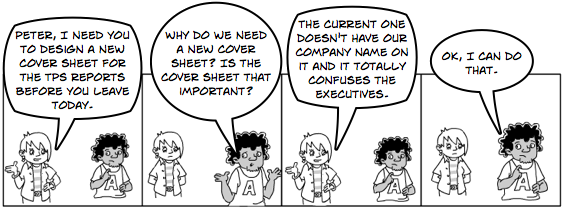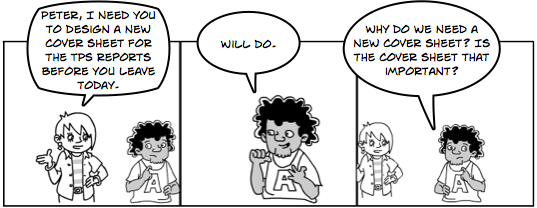I really despise suck-ups. In building a management team I first look for someone that can challenge me and my ideas. There must be an honest, respectful tension of ideas in order to build confidence in the decisions we will make.
The key word from that previous sentence was not honest or tension, but rather respectful.It is in the framework of respect that challenge can exist without being a threat. This is especially important as groups get more comfortable with each other and walls break down. As the old expression goes familiarity breeds contempt.
I think most of us learned early on that the first key to respect is understanding our role. As a kid whenever I asked my mom why I should obey her request that at the time seemed completely illogical she would repeat “because I am your mother, that’s why.” No doubt that was the trump card. No room for any more questions – and she was right.
That relationship exists in all work places as well. Substitute mother with manager and voilà! In most well led groups, the manager doesn’t have to point out the obvious relationship, but it still exists and needs to be respected. This isn’t sucking-up, it’s recognition of the authority.
Picture the scenario where you have just asked one of your employees to design a new cover sheet for the TPS reports.

How did you feel? Peter gave a conditional acceptance of the task predicated on you coming up with a valid reason. You could have just as easily responded “Because I am your boss, that’s why.”
Now picture this conversation.

Peter’s first two words make a huge difference; they demonstrate an understanding of the roles. This subtlety indicates that Peter is going to do what you ask of him and he’d like to ask a few questions to better understand why. The key here is the order – demonstrate acceptance, then you can question. By doing that Peter turns the subsequent conversation into clarifying questions rather than challenging ones. They are still ultimately challenging questions leaving you opportunity to change your mind, but they are presented in a way that doesn’t challenge your authority.
The power of this comes when we turn this conversation around, inserting ourselves as the employee. I learned this little interaction about five years ago. I was amazed at how radically it changed the conversations between my boss and me.
My former boss always loved to have ideas challenged by his team, so I employed heavy doses of that in our one-on-ones. I noticed that my yearly feedback during that time would always have some element indicating that I needed to be more on board with new ideas developed by others. I was confused as I thought I was engaging as was expected. Clearly I was giving mixed signals.
Then I started utilizing the role recognition lesson above. I didn’t change the challenge, I just kept in mind that I needed to demonstrate that I understood my role and how it related to my peers and superiors. It worked and worked well. The proof was in the reviews. Same challenge, different order, different outcome.
I love simple ideas like this that offer such significant change with only a small investment.
Today’s Question
What do you do to promote a healthy manager to employee relationship that allows for ideas to be challenged?






